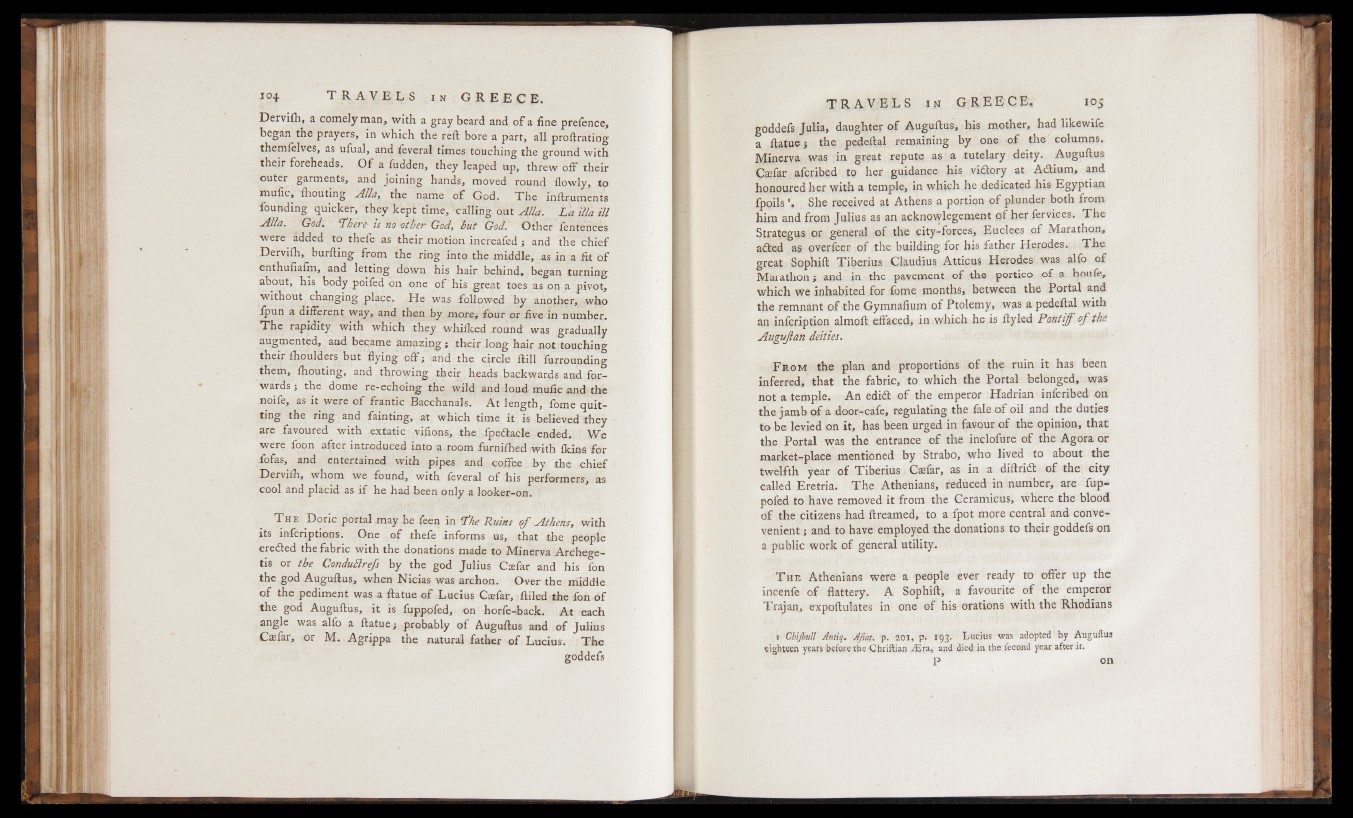
D e r v ilh , a com e ly man, w ith a gra y beard and o f a fine prefence,
b egan the prayers, ih w h ich th e reft bore a p art, all proflxating
themfelves, as ufual, and feveral times touching the ground w ith
th^ir foreheads. O f a fudden, th e y leaped up, th rew o f f their
outer garment^, and *j jo in in g hands, moved - round llow ly , to
ttiufic, - f l io ü t% 'Aïtè; the name'; o f G p d . T h e m o m e n t s
fo u n d in g qùlçWeV, ^ h e y !| e p r tm i e , ^câirihg:Qut Alla. La ilia ill
Alta. God» *?gir£x'ii %di>f%ef'God, tut God.' ÔtheîTfenlfebeès
wéréT“ added to thefe a s their motion increafed f and me c h ie f
D e r v ifh , burfting from the r in g 'into .the .middle, as in a fit o f
enthufiaim, and le t tin g down hi$ h a ir behind, began turning
ab out, h is body p o iK d b ^ ^ n e o f 'h i s grea t toes a s o n ja p iv o t,
whQ
^>un a different way, and then by xnore^ four or five in number.
The rapidity/ with which they whiiked Toùnd .was gradually
augmented, and became amazing ; their long hair not: touching
t h * Ihohlders. but ftying "off /and the circle ftill furrounding
them, ihbutang, .and thpiyaj^j theirjheads backwards.a|pi>-
wards ; the dome re-échoir^ the wild; and iond mufiç and. the
noife, as it were o f frantic BaccHSn'als. At lOTgth;*lolfë'quitting
the ring and fainting, at which time k is .believed they
are favoured with extatic yâfiqiis, ;the;)fp6<aaele -ended.) ' We
were fo ^ .a f e r iatroduced into *a,room f^nifhed w ith fkks for
Tpfas, and entertained with pipes and. .çofffce by the -chief
Dervifti, whom we found, with feveral of h is performers, as
cool and placid as i f he had .been only a looker-on.
T he- DoriC|pontal may^b efeen in ''the. Ruins of Athens, -wM i
its -iafcriptions. O n e o f th e fe in fo rm s us, .jt-hat th e people
ereéted the fab ric w i th the donations made to M in e rv a A rC h e g e -
tis or the ConduSlrefs b y the god Julius Cæiar and his fon
the god A q gn ftu s , w h en Nic ias was arehon. O v e r the middle .
o f the pediment was a fta tue o f L u c iu s Cæfar, j ftiled th e fo n o f
th e god A u gn ftu s , i t is fuppofed, .on horfe-hack. A t each
angle was a lfe a ftatue ; .probably o f Auguftus and o f Julius
Cæfar, o r M . A g r ip p a the natural fa th e r o f L u c iu s . T h e
goddefs
IPS
goddefs, Julia, daughter ef AugVift.USt his mother, had likewife
a ,fta|U?f the pfdeftal re^ p in g by hone-: pf; columns.
Minerva was in great :r§pub? f j j p tutelary deity, A u g u te
Çæfyr ..aferibed tf her ;g.uidauee his victory at A&ium* and
honoured her ypit-h a temple, in which he dedicated his Egyptian
fpUg .gjje mceked st Athens a portion o f plunder both from
bip and ffpm Julius as an aeknowlegement of her ferviees. The
fitrategusiprii generial iof the eky-foreesf, Ewhes o f Marathon*
a died as overfeer -ofthe buildingfor his father flerodes. The
great ; ^ophift TRerius Ckudius Attipus Herodes was alfb of
Marathon j and In the pavement,of the ; porticocipfna houfe,
which we inhabited for ifome months, between the Portal and
the remnant of the Gymnafium of Ptolemy,, was a pedeftal with
an inffcrip6©n almoft effaced, in vsdneh he is fly led Pontiff of iktt
Augujlan deities.
f | y i t the plan and proportions e f thf ruin it has been
inferred, that the fabric, to which the Portal belonged, i was
not a temid»^ An edi& ief the emperor Hadrian inferibe& ®n
the jamb of a door^cafe, regulating the faleof oil and .the duties
to be levied on it, has been urged in favour of the opinion, that
the Portal was the entrance of the inélofure of the Agora or
market-place mentioned by Strabo, who lived to about the:
twelfth year o f Tiberius Gæfer, as in a diftridt o f the city
called Eretriaî The Athenians, r,educed , in. inutnber., are f®p-
pofed to,ihave removed it from'.ithië Ceramiciis, where .the blood
Of the citizens had ftneamed, to a fpot more central and conve-
venient ; and to have employed the donations to their goddefs on
a public work of general utility.
T h e Athenians were a people ever ready to offer up the
inpenfe of flattery. A Sophift, a favourite of the emperor
Trajan, expoftulates in one of his orations with the Rhodians
■ ti'GhiJHutt Antiq. Afiat. p.'-20i,;p« rt)3. Lucius was va8oJrte8 ' by' Àngtiftus
eighteen years iljeforetfae fîhjiftian Æra, and died in the fécond year after.it.^M
P on